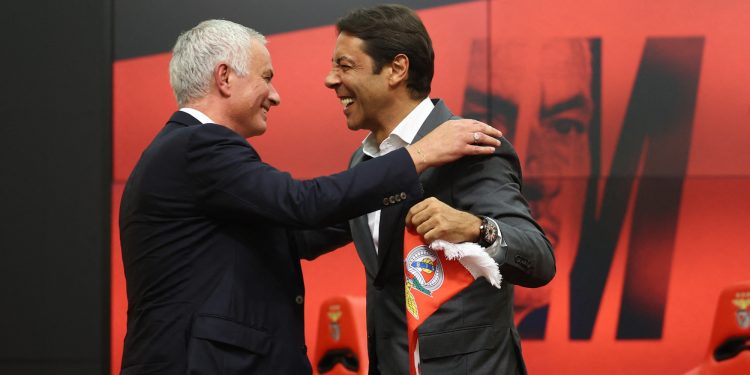Since returning to Benfica in mid-September, Jose Mourinho has been the subject of much discussion. And fuelled at least as much debate. Firstly for his results, but also for what he truly represents.
With the Lisbon club’s presidential election just a few days away, one question arises: Was his appointment the result of a calculated footballing investment, or is it simply a strategic gamble orchestrated by Rui Costa in an attempt to sway opinion in favour of his re-election?
What to remember from Mourinho’s debut with Benfica?
Since signing a two-year contract with Benfica, Mourinho has already made his presence felt. His return to Portuguese football after decades abroad has reignited national interest in the club, with media coverage and fan engagement reaching new heights. In sporting terms too, Benfica fans have reason to celebrate. At least from a purely statistical point of view.
Since he took charge, the Eagles have won three of the six matches they have played, conceding only one defeat, away to Chelsea (0-1) in the Champions League. A lesser evil for a team that is languishing in third place in the Portuguese Liga, four points behind Porto and one behind Sporting.
But what will happen if Benfica fails to close the gap? What about Mourinho’s future? This is a fundamental question, as there is reportedly a clause in the Special One’s contract stating that he and the club’s management may mutually agree to part ways at the end of the season.
Rui Costa’s election strategy or footballing vision?
With Rui Costa seeking re-election as Benfica president on October 25th, the timing of Mourinho’s appointment is hard to ignore. The announcement has dominated headlines, overshadowed other campaign issues and energizing the fanbase. Is Mourinho’s hiring a strategic move to secure votes? Or is Rui Costa genuinely investing in a high-profile coach to elevate Benfica’s sporting project?
From a marketing perspective, Mourinho’s name alone brings global attention. Benfica’s social media metrics have surged, merchandise sales are reportedly up, and international media outlets like The Guardian and L’Équipe have covered the story extensively.This visibility could translate into commercial gains, sponsorship deals, and a stronger brand presence — all valuable assets for a club competing on multiple fronts.
While Mourinho’s track record is impressive, his recent stints at Roma and Tottenham were mixed. Benfica’s decision to offer a short-term, flexible contract suggests caution. It’s a low-risk, high-reward scenario — if results come quickly, the club benefits; if not, both sides can walk away.
In any case, one thing is clear: Benfica is once again at the center of attention. Rui Costa’s gamble may pay off both on and off the pitch — but only time will tell if this move was made for trophies or votes.





